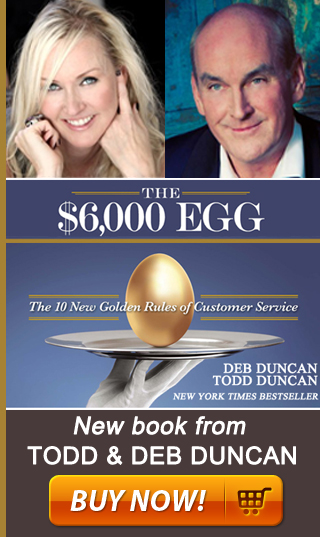Do You Date Your Clients Before Saying “I Do”? |
Dec.29 |

By Todd Duncan
One thing everyone can identify with is dating. Why do people date? I think you’d agree that, generally speaking, dating is for the purpose of learning as much as possible about a person to determine whether there is good reason to invest in a more intimate relationship. And if the dating process continues in good faith, its purpose is also to prepare those involved for a healthy, lifelong marriage.
The truth is that without a sufficient period of dating, many traditional marriages in Western culture, those not arranged by family, tend to be short-lived, because there is much about the other person that remains unknown. There is much that may yet prove to be untrustworthy. Such whimsical marriages tend to stand on precarious commitments, and fall on the same. Recent history has shown, especially in the U.S., that the success of such marriages is hopeful at best, but certainly not probable. And a relationship with a customer will follow the same path.
Sales professionals would increase their success rates dramatically if they did a better job of “dating” their prospects before ever saying “I do” to a sales relationship.
The problem is that most salespeople rush into a commitment without knowing anything substantial about a person. Without knowing whether there are shared values and shared goals. Without knowing the others’ expectations, needs, or desires. As a result, like a whimsical marriage, the success of such relationships is shaky at best.
Before I understood the Law of Courtship, my approach was something like, “Get the prospects you can, take the business you can, and make the money you can.” Using this so-called strategy, I managed to do some business but soon found myself in a maze of problems. The phone was ringing more than ever, with clients on the other end placing demands on me that were unrealistic.
RELATIONSHIPS MUST BE “ESSENTIAL”
The Law of Courtship says that for a sales relationship to work on the outside, it must first be right on the inside. In other words, for you to build loyal, lasting relationships with your clients, you must take the time to know them, not just know about them. And you must allow them to know you. The Law of Courtship is about dating a prospect before you propose a sales marriage. You see, the more you know your prospects—what’s important to them about a relationship with you, what they look for in your product or service, and what they place value on—the more competent and confident you are to make a decision about pursuing a deeper, more meaningful relationship.
Relationships have two parts—essence and form. If essence is wrong, you will spend 90 percent of your time on form.
Every business relationship, personal or professional, is governed by this same principle. In new sales relationships, every prospect will either have an essence match with you or they will not, just like dating. If there is a shared essence, the relationship can be highly profitable and void of unreasonable demands and stress, just like a successful marriage. However, if you and a customer do not have a shared essence, the relationship will suffer under a burden of unrealistic expectations and unneeded stress, like a troubled marriage. Part of your job as a sales professional is to consciously decide what type of relationships you want your business founded on, then stick with that standard.
ASKING FOR SALES SUCCESS
Following the Law of Courtship is not complicated. To do so you must simply discipline yourself to take the steps necessary to determine whether a relationship has a high probability for lasting success before going any further. Confidence in the future success of a relationship comes when a shared essence has been established—when both parties knowingly share the same values, expectations, and desires for the relationship.
In short, the key to the Law of Courtship is making sure that before you get deeply involved with a person, you know with whom you are getting involved. It’s making sure the relationship is right on the inside first, where it matters most, and only then pursuing it further.
PUTTING IT ALL TOGETHER
The trust bond between you and your prospects is the absolute foundation for profitable, long-term relationships. All the sales training in the world will not create lasting success if your prospects don’t trust you. But as trust goes up, tension goes down, and acceptance of your proposition increases.
comments powered by Disqus


 Follow me on Twitter
Follow me on Twitter Like me on Facebook
Like me on Facebook  Connect on LinkedIn
Connect on LinkedIn